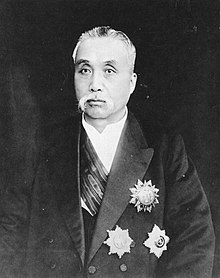Xu Shichang
| Xu Shichang | |
|---|---|
 |
|
| President of the Republic of China | |
|
In office 10 October 1918 – 2 June 1922 |
|
| Preceded by | Feng Guozhang |
| Succeeded by | Zhou Ziqi |
| Premier of the Republic of China | |
|
In office 1 May 1914 – 22 December 1915 |
|
| Preceded by | Sun Baoqi |
| Succeeded by | Lou Tseng-Tsiang |
|
In office 22 March 1916 – 23 April 1916 |
|
| Preceded by | Lou Tseng-Tsiang |
| Succeeded by | Duan Qirui |
| Personal details | |
| Born |
20 October 1855 Weihui, Henan, Qing Dynasty |
| Died | 5 June 1939 (aged 83) Republic of China |
Xu Shichang (Hsu Shih-chang; Chinese: 徐世昌; pinyin: Xú Shìchāng; Wade–Giles: Hsü2 Shih4-ch'ang1; courtesy name: Juren (Chu-jen; 菊人); October 20, 1855 – June 5, 1939) was President of the Republic of China (Beijing government) from October 10, 1918 to June 2, 1922.
Xu's ancestral hometown was Yinxian County (current Yinzhou District), Ningbo, Zhejiang Province. Born in Weihui, Henan, he was Yuan Shikai's closest friend. He was at one time the Viceroy of the Three Northeast Provinces and at the end of the Qing dynasty he was made chief of the general staff despite being a civilian. Xu was also the minister of the cabinet in Prince Qing's Cabinet. He resigned as secretary of state (premier) in protest to Yuan's imperial ambition in late 1915. He resumed his post after Yuan abandoned monarchism.
His election as president was largely engineered by Duan Qirui and his Anhui clique. He was chosen because he was a civilian yet had close ties to the Beiyang Army and was neutral to both its Zhili and Anhui cliques. Lacking any military power of his own, he had to play Duan, Zhili leader Cao Kun, and Fengtian leader Zhang Zuolin against each other to stay in power.
...
Wikipedia
